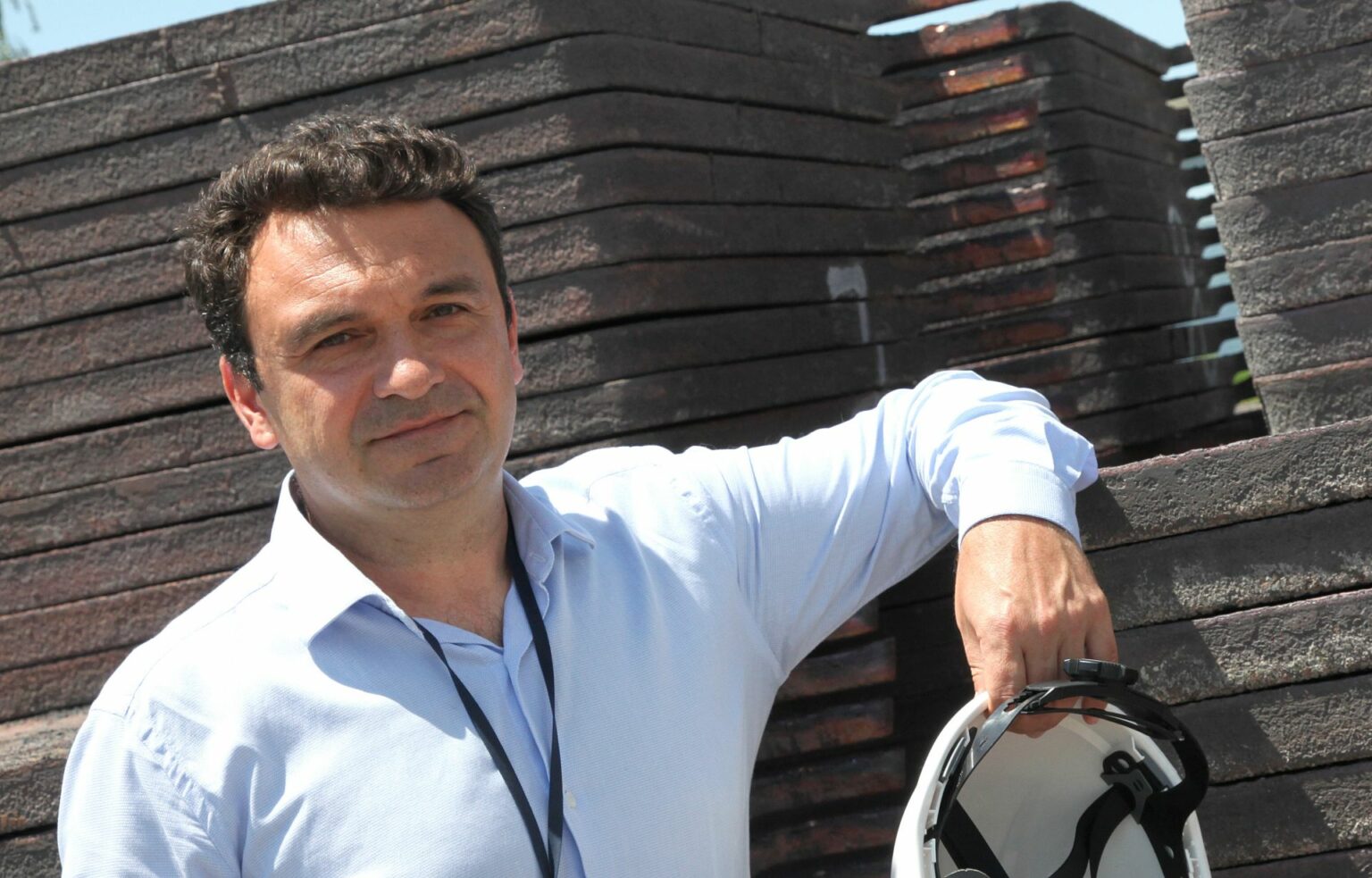The green transition is a major topic on the European Union’s agenda. The plans for the transformation of the economy apply to absolutely all areas of the economy, but they apply with particular force to the most energy-intensive and large-scale industries. The mining and metallurgical industries are one of them. However, it turns out that some representatives of the industry are not in a situation of surprise at all, but have long been working to reduce their energy consumption and energy carriers, the introduction and use of alternative sources, the recovery of their own residual and waste resources. This became clear from the participation of the CFO of Aurubis Bulgaria Ivaylo Vatev during the international forum “Green Transition – Solutions and Challenges for Bulgaria”, organized by Dir.bg and 3eNews in Sofia on October 15.
The company is looking decades ahead, and its strategy, as well as that of the entire Aurubis group, is directly linked to the green transition, even before it became a common EU goal. It is based on three main pillars – increasing energy efficiency, diversifying energy sources, including through own production, and third but not least – ensuring secure and predictable supplies from outside.
Aurubis Bulgaria already has working projects under the first priority of the strategy. An example of this is the process of replacing more energy-intensive electric motors with more efficient ones. A turbine using waste heat from the sulphuric acid production plants runs in parallel at the company’s plant near Pirdop and Zlatitsa. By “capturing” some of this heat, steam is produced. The turbine produces energy which is used in production. This is effectively an in-house CHP plant, but it runs on renewable energy. And the effect, apart from more economically viable energy, is a zero carbon footprint. So ultimately the plant has been able to reduce energy consumption per unit of product, but it will continue to do so. Because, as Ivaylo Vatev also noted during the forum, work is underway to expand the project with a second such turbine and additional own power generation. These projects are also an example of a circular economy, as a new product is produced from the residue, while at the same time the environment is spared.
“Aurubis Bulgaria” will soon put into operation the largest photovoltaic park for its own needs in our country. It is the recently built in partnership with CEZ ESCO 10 MW photovoltaic installation for green electricity production. The plant of 20,000 photovoltaic panels is built on reclaimed land to spare agricultural land, it will cover 2.5% of the average electricity consumption of the production to Pirdop and Zlatitsa. In this way, the company will partially reduce its need for external electricity supply, and in parallel it will reduce its indirect carbon footprint, as it will not use electricity produced, for example, by the thermal power plant.
The company already has plans to build a second photovoltaic park. The process is in the early design phase, and estimates are currently being made as to what capacity it should be. However, it is already clear that it will be built again on reclaimed land – landfill sites for iron silicates.

Both the completed and the future project are part of Aurubis Bulgaria’s strategy to cover 20% of its energy needs from its own RES by 2030 and to increase this percentage to 50 by 2050. This is actually quite an ambitious target in terms of the high energy intensity typical of the metallurgical industry. But clearly and early work is being done to achieve it. Which would be a useful move for many other companies and industries where there is also potential to use residual resources and build RES for their own needs. Such as, for example, another idea of the enterprise in Pirdop and Zlatitsa – to build a hydrocascade of small hydropower plants, which would use the difference in altitude between the plant and the higher dam for industrial water.
A good example is the second focus in the green strategy of Aurubis Bulgaria, which to some extent also covers the first one – diversification of the energy supply for production. This includes not only installations producing energy for own needs, but also ways to use alternative low-carbon fuels in the production process where this is technologically feasible and economically justified. Such a fuel is natural gas, for which a number of European countries, including Bulgaria, are currently struggling to be recognised as a transitional fuel on the road to full decarbonisation. And in metallurgy, blue fuel is a strong carbon footprint reducer, as this industry has plants using petroleum products as a power source, which have a much higher carbon footprint than gas. In the future it can be replaced by the absolutely carbon-neutral hydrogen, even in the Aurubis group there is such a plant – the one in Hamburg. There, tests are currently being carried out to replace natural gas with hydrogen. The aim is that, at some point, the anode furnaces will be able to run on this environmentally friendly fuel, which leaves behind only water after use.
The Bulgarian enterprise in Pirdop and Zlatitsa will soon be able to use natural gas for part of the units. The gas transmission pipeline to the Sredna Gora region is already under construction. At the same time, pipeline construction is also a project that could be useful for future total decarbonisation, as pipelines are seen as the infrastructure that could be used to supply hydrogen. So for the imposition of hydrogen as the main environmentally friendly fuel of the future, which is what it looks like from today’s point of view, the region of the Middle Mountains will be provided with the necessary infrastructure for its supply.
Security of energy supply at predictable prices is very essential for the metals industry. And, as the electricity and gas price crisis that has erupted in Europe and at home in recent months has made clear, for many other industries and sectors of the economy.
The mining and metallurgical industries are very energy intensive and highly dependent on energy and energy supplies. Ivaylo Vatev notes that companies such as Aurubis have an absolute need for security of supply. That is why they cannot cope only with their own renewable energy plants and installations. It is very important for this industry to have price predictability. This is the reason why in recent months of high market dynamics and record price values, companies in this sector have raised the issue of direct long-term contracts between electricity producers and large consumers. Along the energy-price crisis in Europe, the European Commission recalled the possibility of concluding such contracts. They ensure predictability, as electricity is bought from the company at fixed prices or at least within a certain range.
The other problem facing energy-intensive industries is emission allowances. Although they receive energy from external sources, they also indirectly pay for emissions even though they do not generate them. This is why industries like Aurubis Bulgaria pay the costs of the quotas through the price of the electricity they buy. In the EU, there is a package of regulations called the Emission Trading System (EMS), which also provides for protection against so-called carbon leakage, i.e. the export of production to non-EU countries where there is no additional cost for carbon emissions through the electricity and so the price of the final product is not burdened. And such outsourcing leads to loss of gross domestic product, jobs and other negative economic and social effects.
To avoid such situations, part of the ETS regulations allow for the introduction of an offsetting mechanism for the indirect costs of carbon emissions for certain key industries. Copper production is one of them.
A significant point is that compensation for these industries has already been introduced in many EU countries, for example Germany, Belgium, Spain, Finland, Poland, our neighbouring Romania and Greece. In this way, these countries have managed to maintain and help their industries to operate at competitive prices on foreign markets and not to export their production facilities to third countries.
That is why companies in Bulgaria, such as Aurubis, believe that an offset mechanism for carbon allowances should be introduced in Bulgaria. Even some time ago there was a step in this direction – changes were prepared in the Climate Change Act, which provided for covering part of the indirect costs of emissions in the price of electricity. And the bill was even approved at first reading by the 2019 parliament but did not make it to second reading. According to a number of Bulgarian industry representatives and experts, moving this bill forward needs to happen and it is best to make this one of the priority tasks of the new National Assembly. There are also proposals that the funds to offset the indirect costs of harmful emissions should be linked to the price of carbon allowances and come from the Electricity System Security Fund, as this would not directly burden the state budget.
